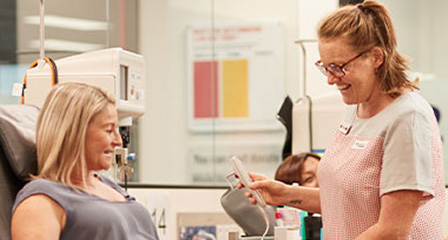Prepare and aftercare
Before you donate
Get your paperwork together
You’ll need to bring some ID with you. It could be a driver’s licence, passport, or your digital donor card in our Lifeblood app. You can use a combination of things for ID, as long as all up you can show any three of these:
- Full name
- Date of birth
- Home address
- Signature
- Photo.
While you’re at it, write down or remember any medications you're taking so you can let our team know (or check them here).
Don’t worry if you’re feeling a bit nervous – it’s completely normal.
Hydrate and eat
One of the most important things you can do to look after your own health is to drink lots of fluids and have plenty to eat.
The day before
- Drink plenty of fluids – 10 glasses for men or 8 glasses for women.
- Try to get a good night's sleep.
- Try to avoid foods that are high in fat or fried. Fatty intake can interfere with plasma collection and laboratory testing.
3hrs before
- Drink 750mL (that’s 3 good-sized glasses) of fluids.
- Have something savoury to eat.
- Avoid strenuous exercise.
At the donor centre
Welcome
When you walk in the door, you'll be greeted by our reception staff member. They’ll check your valid ID. This is probably the best time to speak up if you need your parking validated (if that's available at the donor centre you're in).
Then, you’ll take a seat and fill out the confidential donor questionnaire they give you. (If you'd like to see the questionnaire in advance, here's a sample.)
Interview
In a private room, a trained staff member will go over your questionnaire answers with you and ask some questions to check that you’re fine to donate.
They’ll give you a quick ‘finger prick’ test to check your haemoglobin (a protein which contains iron) and test your blood pressure.
Donate
Sit back and relax on a comfy couch. You can read, chat with our team or other donors, or just enjoy some quiet time.
We’ll keep a close eye on you the whole time to make sure you’re OK. Talk to a staff member if you feel uncomfortable or worried at any point.
Congratulations! Your donation is done. Now it's time to celebrate.
After you donate
Right after
It’s tempting to hurry over to the refreshments area to have your pick of the snacks, but take your time before you get up. It’s important that you rest for around 5 minutes in the donor chair.
When you’re ready, you can head over to the refreshments area to relax for 15-20 minutes. Find your favourite snack, have a cool drink, maybe make a cup of tea, and enjoy.
Make sure you grab a juice or water on your way out.
In the next 8 hours
Drink plenty more fluids. Aim for 3 glasses of fluids in the first 3 hours.
Take a seat when you can. Your body needs a bit of time to recover, so try to avoid spending too much time on your feet.
Try not to overheat. Some days it’s tricky, but do your best to avoid hot showers, rushing around, standing in direct sun and hot drinks.
Stay away from alcoholic drinks.
Eat regular meals — you’ll need your energy.
For at least 12 hours
Avoid strenuous exercise (like cycling, jogging or going to the gym) or hazardous activities, including activities or jobs where public safety may be affected. Check any employment or safety requirements you have. If unsure, please discuss at your interview.
Most people feel great after they donate. In fact, you’re probably feeling pretty good about yourself (as you should!), but if you feel unwell at any point, please call us on 13 14 95.
Handy tips to help
Hours and locations
You can search for a donor centre to find the best place to donate, whether you're home or away.
We've listed 'donation type' for each donor centre, if you're unsure what you can donate.
In some donor centres, you can donate blood only. In other centres, you can donate blood or plasma ;– or platelets, if you're male and have previously donated plasma.
On our donor centre pages, you can find:
- hours and locations of your nearest donor centre
- a map and directions, if you need, from Google Maps
- tips for parking, and more.
If you're ready to donate, or looking to book another donation, you can then 'check availability' to find the time that best suits you.
What to do if you feel unwell
We'd love to see you when you're feeling healthy and well. If you're not feeling great before you donate, log on to manage your donation
Simply find another time that suits your style and we'll see you soon, with your favourite snacks ready and waiting.
If you feel unwell during or after you donate, it’s important to let us know so our expert team can ensure your comfort and safety. Simply call 13 14 95 and our team can give you advice.
Occasionally, side-effects can occur while you're out there saving lives. Rest assured that most are minor and will go away quickly, such as minor bruising, and feeling faint or fainting.
Keep your bandage on
You can reduce the risk of bruising by keeping the bandage on your arm for 2 hours after donating, and by avoiding heavy lifting and strenuous use of your arm for the next 24 hours.
If a bruise is causing any kind of discomfort, try the following:
- Keep the bandage on your arm for the next 4 hours.
- Hold a cold pack wrapped in a clean cloth over the bruise. Only do this for 15 minutes at a time, 3-4 times in the first 24-48 hours.
- After 48 hours, apply a hot pack wrapped in a clean cloth. Do this for 15 minutes at a time, 3-4 times a day.
- Use mild pain relievers like paracetamol (not aspirin or anti-inflammatory medications like ibuprofen which may make bruising worse).
- If you're bleeding from where the needle went in, simply apply pressure and raise your arm.
If your bruise is causing severe pain, numbness, inflammation, stiffness or swelling, call us on 13 14 95 to talk to one of our medical officers.



